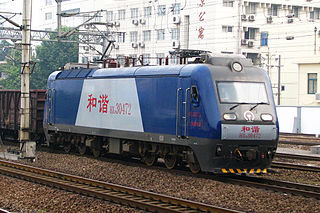 W
WHXD3 is an electric locomotive built in Mainland China by CNR Dalian Locomotives.
 W
WThe Toshiba DeRoI-class was a group of nine boxcab-style electric locomotives with regenerative braking and the capability for multiple-unit control manufactured by built by Toshiba in 1943-1944. They were very similar to the Mitsubishi-built DeRoI-class locomotives and the DeRoNi-class locomotives built by Hitachi. They were built for the Chosen Government Railway (Sentetsu), and after the partition of Korea were inherited by the Korean State Railway of North Korea, where they were known as the Chŏngiha class.
 W
WThe Indian locomotive class WAG-2 is a class of 25 kV AC electric locomotives that was imported from japan in the 1960s for Indian Railways. The model name stands for broad gauge (W), AC Current (A), Goods traffic (G) engine, 2nd (2). A total of 45 WAG-2 locomotives were built by The Japanese Group between 1964 and 1965. They entered service in 1964.
 W
WIndian locomotive class YAM1 is the first, and so far only class of metre gauge (Y), Alternating Current (A), mixed traffic (M) electric locomotive in India. Twenty were built in 1964–66 by a Japanese consortium led by Mitsubushi.
 W
WThe Class DF50 (DF50形) is a class of Bo-Bo-Bo wheel arrangement diesel-electric locomotives operated by Japanese National Railways (JNR) in Japan from 1957 until 1983.
 W
WThe Class ED73 (ED73形) was a Bo-Bo wheel arrangement AC electric locomotive type operated by Japanese National Railways (JNR) in Kyushu, Japan, between 1962 and the 1980s.
 W
WThe Class ED76 (ED76形) is a Bo-2-Bo wheel arrangement AC electric locomotive type operated on passenger and freight services in Japan since 1965, originally by Japanese National Railways (JNR), and later by Hokkaido Railway Company, Kyushu Railway Company and Japan Freight Railway Company. As of 1 April 2016, just 10 locomotives remained in service, all operated by JR Freight.
 W
WThe Class EF10 (EF10形) is an electric locomotive built for the Japanese Government Railways formerly operated on freight services in Japan from 1934 until 1983.
 W
WThe Class EF58 (EF58形) is a class of Japanese 2-C+C-2 wheel arrangement DC electric locomotives. 172 locomotives were built between 1946 and 1958.
 W
WThe Class EF60 (EF60形) was the first Japanese second-generation DC electric locomotive type with six driven axles, and the first versions used the same MT49 390 kW traction motors as the ED60 and ED61 designs. A total of 143 locomotives were built between 1960 and 1964 by Kawasaki, Tōshiba, Tōyō & Kisha Seizō, and Mitsubishi. The class was split between 129 freight locomotives designed to supersede the mammoth EH10s on Tōkaidō and Sanyō Main Line freight, and 14 passenger locomotives (EF60-500) to replace EF58s on sleeping car trains on the Tōkaidō and Sanyō Mainlines.
 W
WThe Class EF62 (EF62形) is a Co′Co′ wheel arrangement DC electric locomotive type built between 1962 and 1969 for use hauling passenger and freight on the Shinetsu Main Line and particularly over the extreme 66.7‰, (6.67%), gradient of the Usui Pass between Yokokawa and Karuizawa. The prototype, EF62 1, was built by Kawasaki Sharyō in 1962, with the full-production locomotives built by Kawasaki, Tōshiba, and Tōyō & Kisha delivered from 1963 onward.
 W
WThe Class EF63 (EF63形) is a class of 1,500 V DC electric locomotives formerly operating in Japan.
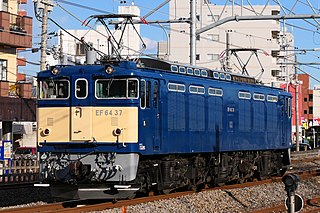 W
WThe Class EF64 (EF64形) is a 6-axle DC electric locomotive type operated on passenger and freight services in Japan since 1964.
 W
WThe Class EF65 (EF65形) is a 6-axle DC electric locomotive type operated on passenger and freight services in Japan since 1965. A total of 308 locomotives were built between 1965 and 1979, with 52 still in service as of 1 April 2016.
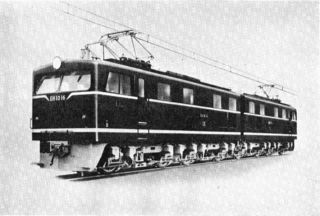 W
WThe EH10 class of electric locomotives were Bo′Bo′+Bo′Bo′ wheel arrangement two-unit DC freight locomotives operated by Japanese National Railways (JNR) in Japan from 1954 until 1982.
 W
WThe Class EH200 (EH200形) is a Bo′Bo′+Bo′Bo′ wheel arrangement twin unit DC electric freight locomotive operated by JR Freight in Japan since 2001.
 W
WThe Class EH500 (EH500形) is a Bo′Bo′+Bo′Bo′ wheel arrangement multi-system AC/DC two-unit electric locomotive type operated by JR Freight in Japan since 1997.
 W
WThe Class EH800 (EH800形) is a Bo′Bo′+Bo′Bo′ wheel arrangement multi-voltage AC two-unit electric locomotive type operated by Japan Freight Railway Company in Japan hauling freight trains on the Kaikyō Line through the Seikan Tunnel separating mainland Honshu with the northern island of Hokkaido. A prototype locomotive was delivered in January 2013 for evaluation and testing, with full-production locomotives delivered from June 2014, entering service from July 2014.
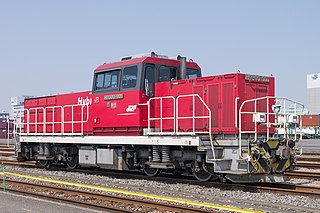 W
WThe Class HD300 (HD300形) is a hybrid diesel/battery Bo-Bo wheel arrangement shunting locomotive type operated by Japan Freight Railway Company in Japan. Following the delivery and evaluation of a prototype locomotive in March 2010, the first full-production locomotive entered service in February 2012.
 W
WThe Meitetsu Class EL120 (名鉄EL120形) is a Bo-Bo wheel arrangement DC electric locomotive type operated by the private railway operator Meitetsu in Aichi Prefecture, Japan, since 2015. The two locomotives, numbered 121 and 122, will replace the Meitetsu fleet of two DeKi 400 and four DeKi 600 locomotives during fiscal 2015.
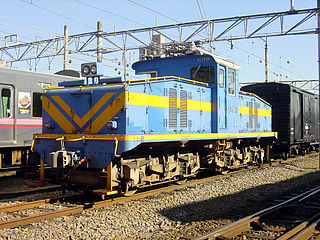 W
WThe Meitetsu DeKi 600 was a Bo-Bo wheel arrangement electric locomotive type operated by private railway operator Nagoya Railroad (Meitetsu) in Japan from 1943 until 2015.
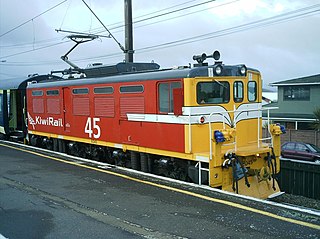 W
WThe New Zealand EA class of electric locomotives were used on the New Zealand rail network between 1968 and 1997 on the Otira – Arthur's Pass section of the Midland line in the South Island, through the Otira Tunnel. Following reconditioning, three were used by KiwiRail's Tranz Metro in Wellington from 2008 to 2011 to top and tail Metlink suburban passenger trains as an interim measure before new rolling stock arrived. Four of the five locomotives were scrapped in 2013 with one being set aside for preservation.
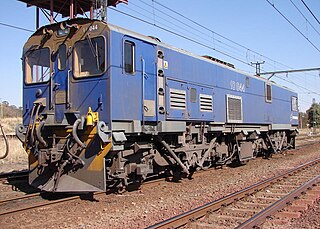 W
WThe South African Railways Class 10E of 1985 is an electric locomotive.
 W
WThe South African Railways Class 10E2 of 1989 is an electric locomotive.
 W
WThe Transnet Freight Rail Class 15E of 2010 is a South African electric locomotive.
 W
WThe Transnet Freight Rail Class 19E of 2009 is a South African electric locomotive.